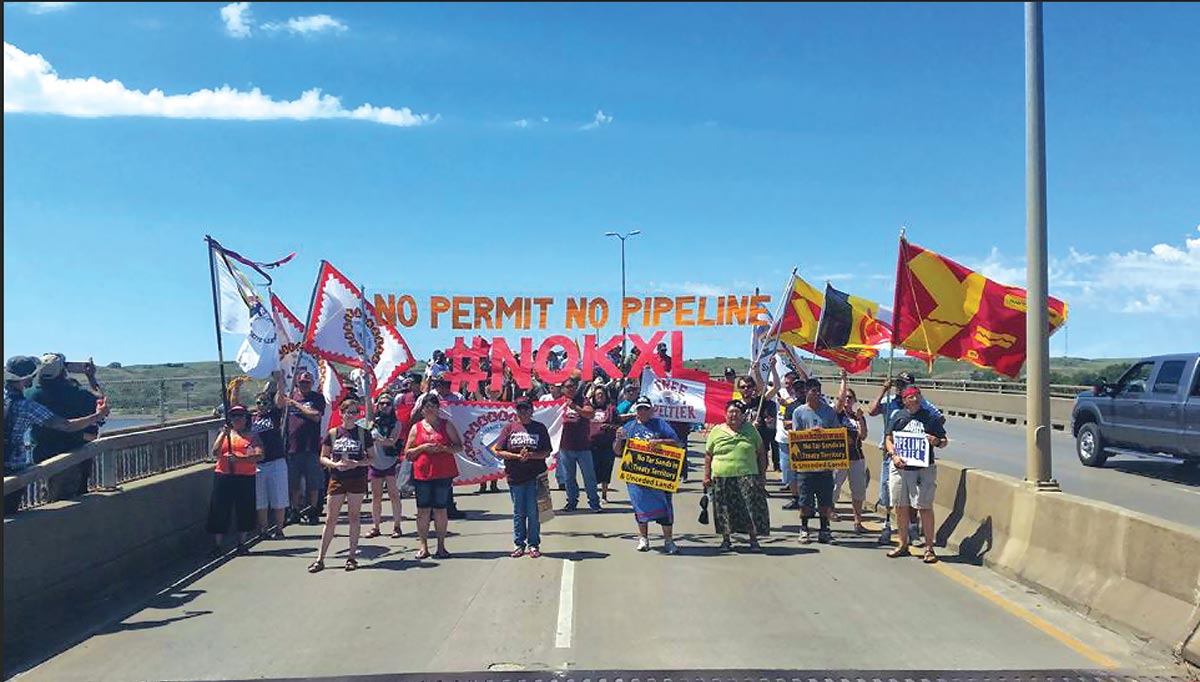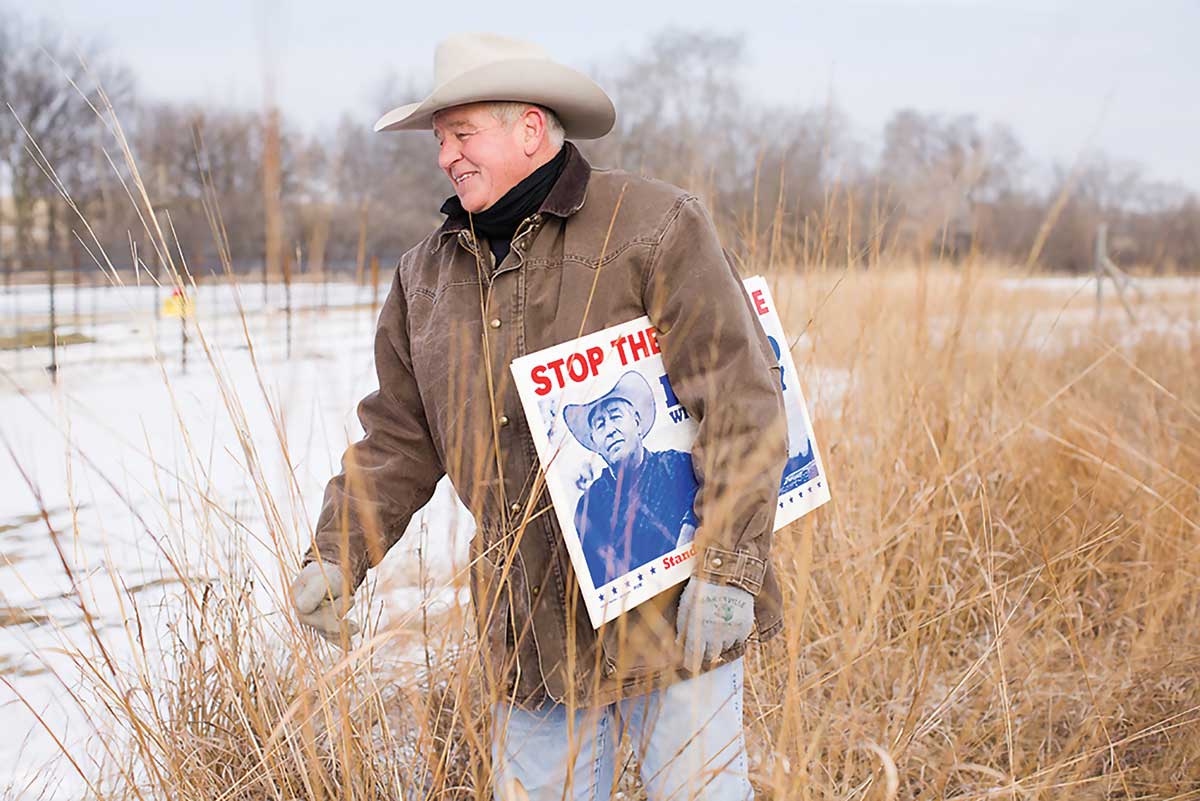 This story is published as part of Covering Climate Now, a global journalism collaboration strengthening coverage of the climate story.
This story is published as part of Covering Climate Now, a global journalism collaboration strengthening coverage of the climate story.
When I got the call from the National Wildlife Federation back in 2010 asking me to help organize opposition to a large pipeline, I had never worked on climate change—or any environmental issue. All of my work up to that moment had been focused on helping kids learn to read, pushing back against insurance companies denying women access to treatment for eating disorders, and getting the Democratic Party to invest resources in the youth vote. I was an unlikely climate change advocate who was about to help organize an unlikely alliance of farmers, ranchers, tribal nations, and environmentalists to stop one of the riskiest and largest fossil fuel projects in the middle of America: the Keystone XL pipeline.
We did stop that pipeline—the Obama administration rejected it in 2015—but now we have to stop it again. The governments, corporations, and banks behind Keystone XL are trying to revive the project through billions of dollars in subsidies and regulatory rollbacks that, in this pandemic moment, only magnify the threat it poses to the people, land, and water along the proposed route. As my colleague Bill McKibben wrote, Keystone XL’s backers are exploiting the distraction stemming from the pandemic “to do things they could not get away with at any other time.”
The Keystone XL battle convinced me that we are at a moment in America and around the world where typical organizing is not enough anymore. Showing charts of scientific data will not save the planet. Sending e-mails, holding rallies, and tweeting will not save the planet. And organizing around climate change mostly on the coasts will not save the planet. Listening to the people on the front lines of the climate fight, especially those in red and rural communities, is absolutely what we need to do in every single state across our country.
For the past 30 years, national climate groups have focused their education, energy, and financial resources organizing in urban communities and mostly on the coasts. Their outreach has yielded amazing results—from shuttering coal plants in cities to blue-state governors signing historic climate change laws. Yet most of our fights against fracking, pipelines, and other fossil fuel infrastructure are happening in rural communities. The land needed to build out projects to provide the massive amounts of renewable energy we’re going to need to kick our fossil fuel addiction is in rural communities. And the unlikely alliance we need to build for a true climate change movement is in rural communities.
Popular
"swipe left below to view more authors"Swipe →
Randy Thompson, a Nebraska cattleman, would never in a million years have thought that he would become one of the leading faces and voices of the Keystone XL fight. His parents worked for decades to earn enough money to purchase land of their own. Then one day a land agent with TransCanada, the company behind the pipeline, knocked on his mom’s door and told her if she did not take the company’s offer, that very day, TransCanada would seize her land through eminent domain and she would get nothing. That one door knock changed Randy’s life forever, putting him on the front lines of what would become an international story and a true David and Goliath battle. Randy did not enter that fight because of the carbon the pipeline would carry. He entered the fight to protect his family, to protect the land, and to protect the water.
Most of us in Nebraska, myself included, did not get involved in stopping the Keystone XL pipeline because of climate change. But through the relationships we formed with environmental groups, we started to educate ourselves about the climate implications of tar sands and pipelines. Not once did McKibben, the cofounder of 350.org, or Tiernan Sittenfeld, the political director for the League of Conservation Voters, tell us we were not welcome at the table because we came to the fight to protect property rights and water. Instead, they changed their messaging to include us, and we in turn changed ours to also talk about the real consequences of climate change to our crops and homes.
In my book, Harvest the Vote: How Democrats Can Win Again in Rural America, I go into great detail about how we formed an unlikely alliance to stop the Keystone XL pipeline and where we can go from here to build a true movement of activists to stop climate change. We organized creative actions, from an 80-acre work of crop art asking President Obama to side with the heartland over the pipeline to carving messages into pumpkins as a fun way to educate the public about the risks of tar sand oil. As one of the leaders, I spent a tremendous amount of time visiting farmers, ranchers, and Indigenous allies. My friend Frank LaMere, a Winnebago leader we lost last year, told me early on in the fight that the only way we can organize to win is if we “collect road dust.” What he meant was that we need to go where the people are—and the people who would stop the Keystone XL pipeline were in rural communities, both Native and non-Native. They rose up to the moment they were all called to lead because we organized together with creativity and a strong sense of place.
I’m not a policy-maker, but I do have a unique perspective from my involvement in the fight against the Keystone XL pipeline, my work as an organizer, and my personal life as a neighbor in rural America who listens to what folks are saying. Organizing in rural communities is critical if we are serious about not only passing a Green New Deal but also, more important, implementing the ideas behind that policy framework. Senator Jon Tester, a moderate Democrat from Montana, will make the Green New Deal stronger with his ideas. Conversations between Tester and progressive champion Representative Alexandria Ocasio-Cortez will result in rural America counting just as much as our coastal cities. He can explain how farmers already confront climate change with cover crops, water sensors, rotational grazing, and other regenerative agricultural practices. She can bring to the discussion the increased risks of asthma from polluting coal plants near communities of color. These conversations will result in unlikely alliances that will change climate conversations and change the face of what a climate justice movement looks and sounds like.
As progressives, we spend a lot of time talking about a just transition, yet the majority of the climate movement spends little time in rural communities listening and learning about what justice looks like for people—including tribal nations, farmers, fisherfolk, and people of color—who live and work in our small towns. If we are serious about climate justice, then including rural voices and ideas at the table, from the beginning, must start to happen.
Rural communities have the land needed to grow and build solar, wind, biofuel, and other renewable energy sources. You will continue to see massive opposition to these large-scale projects because rural communities have not been included in the plans and discussions about the best places to build or the fairest way to structure profit sharing for those communities that will bear the burden of the construction. From most climate advocates who live on the coasts, I often hear, “Windmills are so beautiful. Why would anyone object to building them?” It is easy to say that if you do not live under a 300-turbine wind farm. It is easy to say that if a share of the profits hadn’t been denied to all the residents of your community—and given instead only to those who own the land where the windmills were built.
Maybe it would be easier if we could just close a coal plant and build more wind and solar projects to power our communities, and that would be the end of that story. But there are people, families, money, and land involved, so it is not that easy. Our country has allowed big corporations to control the type of energy produced and where it is produced and who it is sold to. We’ve been told we do not get a say in the process because when we flip on a light switch to power our homes, energy is there, and it is reliable, so we should remain quiet and happy. The energy system worked for us for decades, but now the entire equation has to be flipped because we know the devastation climate change brings to our communities with continued fossil fuel development.
Senator Bernie Sanders, when asked about climate change in 2017 by a coal worker, nailed the response. He made it clear he believed in the reality of climate change, acknowledged that coal jobs had been declining since the 1970s, and then looked at the young miner and said, “I don’t hold this gentleman and the coal miners responsible for climate change. In fact, these guys are heroes. I grew up in a rent-controlled apartment, and I will never forget the piles of coal that kept my house warm.”
Sanders went on to describe how our nation must honor the pensions the coal miners earned; he talked about the need to reinvest money in communities devastated by climate change. We can acknowledge the hard work, not leave anyone behind, and make it clear where we stand on the changes we must make now. We can build out massive new and necessary clean energy projects with the people who live on, love, and work the land—working for climate justice while working to confront climate change.
Organizing in rural communities is not easy. You can’t just parachute an organizer in thinking that magic—or anything—will happen quickly. We have to move beyond theories of change and get to the work of old-fashioned actions that build trust and power at the local level. Part of that organizing is showing up and being ready to stand with rural people when they are hurting, listening to the ideas they have to solve the challenges we face. We do not have to change our values or platform to win back rural voters; instead, we need to stand with them as family farms are flooded and their land is being taken through eminent domain to build pipelines.
When I interviewed Tester, the only working farmer in the US Senate, for my book, he said, “Showing up is the foundation to building the house. If you don’t start there, you are screwed. If you are an attorney from Manhattan, then don’t pretend you are a backhoe operator from Indiana. Don’t change who you are. Just come to where we are.”
Showing up for rural communities is the foundation of winning back not only the White House but also the Senate. Unless we start to elect Democrats again from so-called red states, everything we care about and are pushing for will be blocked in the Senate. Which means we won’t be able to fix gerrymandering. We can’t get rid of big money in politics. We don’t get student debt forgiveness. We don’t get fairness in voting rights. We don’t get LGBTQ workplace protections. Simply put, we cannot win back the Senate without rural voters. And we don’t win back rural voters without organizing and funding the groups and candidates on the ground.
Consider this when thinking about why we should be funding red state organizing and rural candidates: The US population is moving to fewer, mostly coastal states. By 2040, the majority of Americans will live in just eight states. But because the Constitution gives each state two senators, more and more power will be concentrated in less populous, mostly rural states. In fact, just 30 percent of Americans will elect 70 percent of the Senate. The rural states won’t just control the majority of the Senate; they will also have the majority of governors’ seats and state legislative seats, which in our federal system decide on everything from climate change to health care across the country. If you think focusing on President Trump is the answer, think again.
If we want structural change, we need to focus on the architecture of the political machine. This means we need to organize and pour money into groups on the ground so we can begin to earn the trust of rural voters again. Otherwise, we are ceding power to right-wing politicians who figured out this equation decades ago.
Funding the groups and candidates who are organizing in our rural communities should be near the top of the list for anyone who cares about climate change. In Nebraska we created a block captain program in which over 650 volunteers are assigned 50 voters in their neighborhoods. The block captains talk to their neighbors three times during the election cycle, helping them complete vote-by-mail applications and learn about the Democratic candidates.
In 2018 over 850 Democrats were on the ballot in Nebraska, and 73 percent of them won their elections. We did not win any of the statewide or federal seats. But we did take control of various county boards, mayor’s offices, and state legislative seats, resulting in, to cite one climate change example, denial of a permit that Costco wanted to build a massive industrial agriculture operation in Lancaster County. This is how we organize and build power. When we earn the trust of voters, when we show them we can govern and protect their interests over those of big corporations, that is when we can start winning statewide again. We meet people where they are, and we acknowledge where we have differences and where we have common ground. We build together.
Energy and climate change are at the very heart of how our country will move forward. Unlikely alliances among tribal nations, farmers, ranchers, and environmentalists—like the ones that developed during the Keystone XL campaign—can be a model for how to shape legislation and the necessary steps to effectively organize so our country can truly address climate change.
Our kids and grandkids are depending on us to get this right. If we put people at the center, we can create an energy system that is fair and that is not killing the planet. If we invest in rural organizing, we can start to elect candidates, from state legislatures to the US Senate, who understand and prioritize climate action and climate justice. Or we can allow big corporations to keep lining the pockets of politicians who have a spine when campaigning but forget who elected them once in office.
America should be leading the way to create an entirely new energy infrastructure. The only way we can do this is to bring rural people and tribal nations to the table. They have the land. They also will increasingly have the votes to approve or block the laws needed to spur clean energy and climate action. Either we respect this or we keep spinning our wheels with white papers and fancy terms like “just transition”—when we could be organizing and putting power back in the hands of the people.




